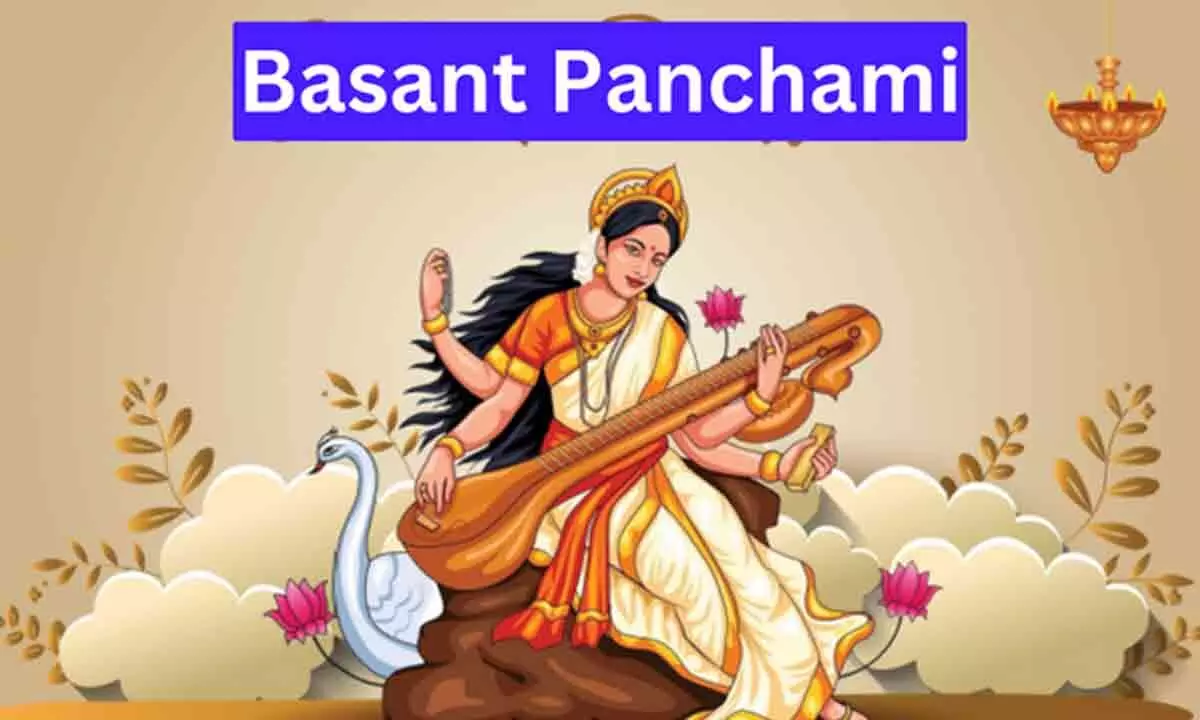Live
- Rythu Bharosa to pick best from PM -KISAN scheme
- Medak wears season’s festive look
- TG sets record in fine rice purchase
- Maintaining India’s growth momentum
- Study Reveals Teabags Release Billions of Microplastics and Nanoplastics, Entering Your Body
- Workplace Wonders: Creative Secret Santa Gifts for Colleagues
- Kumbh Mela 2025: Essential Guide to Comfortable and Respectful Attire for Maha Kumbh
- Hyderabad Real Estate Faces Setback: Property Sales Drop 7% Year-on-Year in 2024
- Gnani’s Gen AI Solutions Revolutionising BFSI
- Congress Party Celebrates Christmas in Gadwal District with Unity and Joy
Just In
Basant Panchami 2024: Date, timing, history, significance and rituals of the festival


Basant Panchami, also known as Vasant Panchami or Shri Panchami, holds a significant place in Hindu festivals.
Basant Panchami, also known as Vasant Panchami or Shri Panchami, holds a significant place in Hindu festivals. Celebrated on the onset of spring, this festival falls on the fifth day of the month of Magha. It marks the beginning of preparations for the vibrant festival of Holi, which commences forty days later. The landscape of India is adorned with mustard flowers during Basant Panchami, making yellow the predominant color associated with the occasion. The festival is dedicated to honoring the goddess Saraswati, the embodiment of knowledge, creativity, and music. It's a time for celebration and togetherness, marked by feasting and sharing joy with loved ones. Let's delve into the various aspects of this auspicious day.
Basant Panchami 2024: Date and Timing
According to Drik Panchang, Basant Panchami will be observed on Wednesday, February 14, 2024, this year. The auspicious timings for the day are as follows:
• Vasant Panchami Muhurat: 07:01 AM to 12:35 PM
• Vasant Panchami Madhyahna Moment: 12:35 PM
• Panchami Tithi Begins: 02:41 PM on February 13, 2024
• Panchami Tithi Ends: 12:09 PM on February 14, 2024
Exploring the History
Legend has it that Kalidasa, a renowned poet, was on the brink of taking his own life upon learning of his wife's departure. In a divine intervention, goddess Saraswati emerged from the river and instructed him to bathe in its waters. This act transformed Kalidasa's life, endowing him with wisdom and poetic talent. Another tale recounts how the god of love, Kama, disrupted Lord Shiva's deep meditation following the demise of his wife Sati. Seers urged Kama to awaken Shiva from his trance, leading to a series of events where Kama's actions eventually led to his demise. However, on Basant Panchami, Shiva pledged to resurrect Kama's wife, Rati, after her forty days of penance.
Significance of Basant Panchami
Yellow assumes great significance on Basant Panchami. Devotees adorn themselves in yellow attire, worship goddess Saraswati, and indulge in traditional delicacies. Yellow symbolizes not only knowledge but also the vibrant mustard fields that herald the arrival of spring.
Rituals and Puja Observance
Basant Panchami is synonymous with the worship of goddess Saraswati, revered as the patroness of learning by intellectuals, artists, and students alike. Devotees flock to temples to seek her blessings for creativity, wisdom, and knowledge. Donning yellow attire, devotees rise early to offer prayers to the goddess. Puja rituals include the offering of yellow flowers and sweets, along with the recitation of hymns and mantras in her honour.
Conclusion
Basant Panchami is not just a festival; it's a celebration of rejuvenation, wisdom, and the onset of spring. As devotees pay homage to goddess Saraswati and revel in the vibrancy of yellow, the festival fosters a sense of community and spiritual upliftment.

© 2024 Hyderabad Media House Limited/The Hans India. All rights reserved. Powered by hocalwire.com






